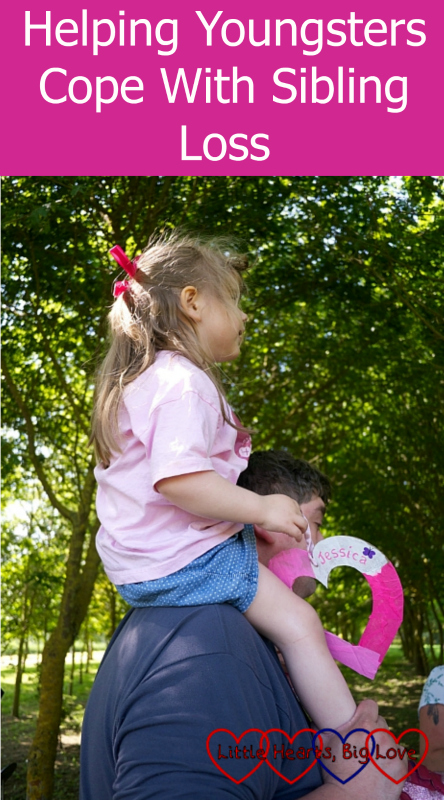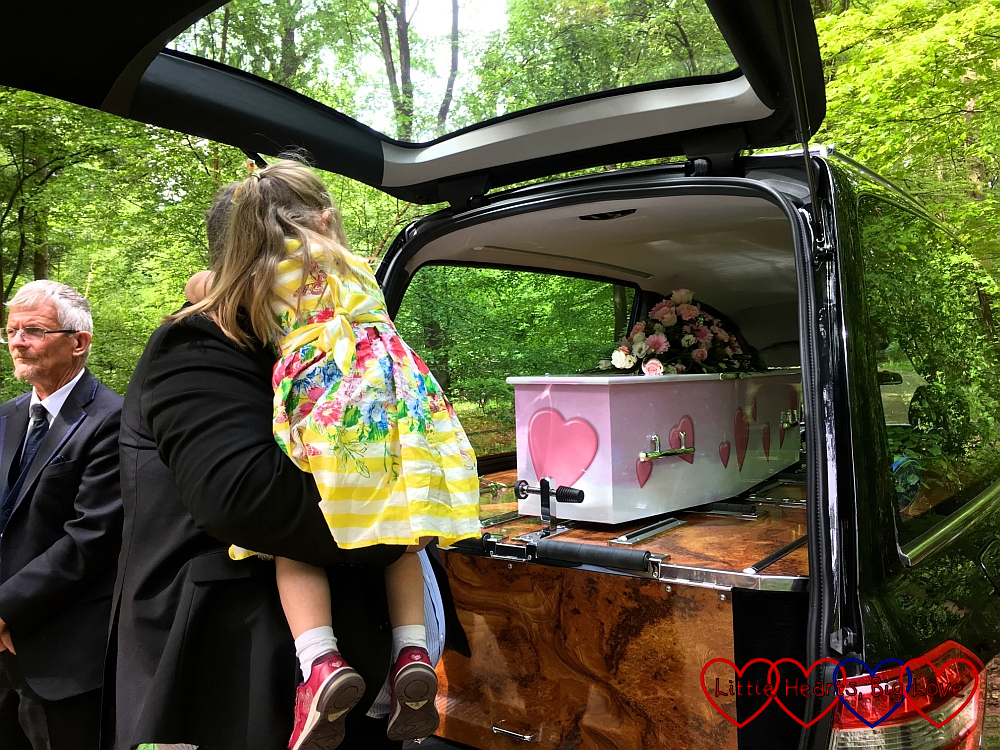One of the challenges that we face as bereaved parents is helping our younger daughter through her own grief journey after losing her big sister. Sometimes Sophie will talk to us about Jessica and cry because she misses her big sister. Other times, her grief manifests as behavioural changes – pushing boundaries, being more clingy, getting angry more easily. It is hard sometimes to help Sophie navigate her grief journey whilst trying to simultaneously cope with our own grief. So far, we have been open with her. We have books to help explain things and we have created a safe space for her to go to when everything feels too much.
Learning more about how we can help Sophie through the loss of her sister is helpful to us as parents. Today I am sharing a guest post from Lianna Champ, a funeral director and certified Grief Recovery Specialist. Lianna has had over forty years of experience in bereavement support. She has recently written a book “How To Grieve Like A Champ”. This book includes chapters on helping support children through loss. Here, Lianna shares her advice on helping support a child through sibling loss:

When a young child suffers the loss of a sibling, their view of the world and their sense of security are threatened and all that is familiar changes. Children learn their coping mechanisms from the adults around them. They may not always hear what the adults are saying but they will always watch what they do, therefore it is important that the adults around them keep their behaviour and routines as normal and familiar as possible to ensure the child feels safe. Even through your own grief, please remain a constant source of love for them. They are trying to assimilate what has happened, trying to find an outlet for their pain. They may be unable to find the words to describe that pain. Like adults, they are trying to find coping mechanisms to release the explosion of internal emotion. We can teach them that it is OK to cry when we are sad, to share our tears together. By being emotionally honest when we experience our own losses we can teach our children that it is ok to express their sadness when they feel it.
Even though grief and all of the associated feelings are normal and natural, children are often told not to feel the way they feel. Just as they would try on a new pair of trainers to see how they fit, children need to give their feelings verbal expression in order to connect fully with what is going on inside them. Speaking their words out loud can help unravel emotional confusion, can help make sense of what is going around and around in their heads. Verbalising emotional pain is a powerful release and does not require any comment from others, apart from acknowledgement and acceptance. Don’t interrupt children when they offload. Sometimes it needs to be a one-way conversation. Interruption may break the thread of feeling and drive the emotion deep down inside. The way we teach children how to cope with their losses in childhood sets a pattern for the rest of their lives. We can teach them to embrace all life experiences and to process their emotional responses – good, bad, happy or sad – as they arise. Life is not an endless series of happy moments and is always interspersed with traumas. By accepting and experiencing all life events as they occur we can live fully and meaningfully as long as we can process emotional events practically as they arise.

Children have short attention spans and may ask the same questions several times. Always be patient with them and answer honestly. It is normal for children to feel anger, fear and confusion because they don’t understand or can’t accept that they can’t see their brother or sister any more. Memory is how we hold on to the things we love.
Choosing photographs together to make a scrapbook can evoke lovely conversations and memories to share. Choose a beautiful memory box for cherished items. Have a memory hour where they think of their favourite memories, drawing pictures too can be helpful.
Grief can also manifest physically in both children and adults. Children may become clingy, wet the bed or want to sleep with the lights on. All these changes are quite natural as they try to find an anchor in this new chaos of their lives. This is their way of trying to process their pain and they need time to balance. Give them lots of love and reassurance. Explain in simple words that whatever they are experiencing is normal and natural for therm. Above all, try not to make them feel that there is something wrong with them. Be ready to answer any questions at all times.
Let them feel safe about opening up without fear of judgment. Children are naturally curious. When they ask questions – answer with honesty. Don’t try to distract them from their sadness by offering them sweets or chocolate in an attempt to make them feel better. This can send mixed messages, suggesting that feeling sad is wrong rather than accepting and working through their emotions. Offering sweets or chocolate can inadvertently drive them to soothe themselves with food or some other substance, which can manifest in later years as ‘comfort eating’. Every time something emotionally challenging happens, they may seek the answer in food or other substances.
If you feel like crying, let them see your tears. Show that it’s OK to cry when we feel sad. Don’t try to change how they feel. Encourage them to talk through their tears – the emotion is contained in the words and the words help to unravel the confusion.
Programming children with incorrect information as to how to deal with loss will create negative coping mechanisms. They need to learn that it is OK to talk about their brother or sister who has died even if it does make them sad. When we are happy, we want to share our happiness. It is the same when we are sad – both emotions need equal expression. Our memories are the fruits of grief.

Lianna Champ has over 40 years’ experience in bereavement and grief recovery. Her new book How to Grieve Like a Champ is out on 7 June 2018, priced £9.99. To find out more go to: http://www.champfunerals.com/

